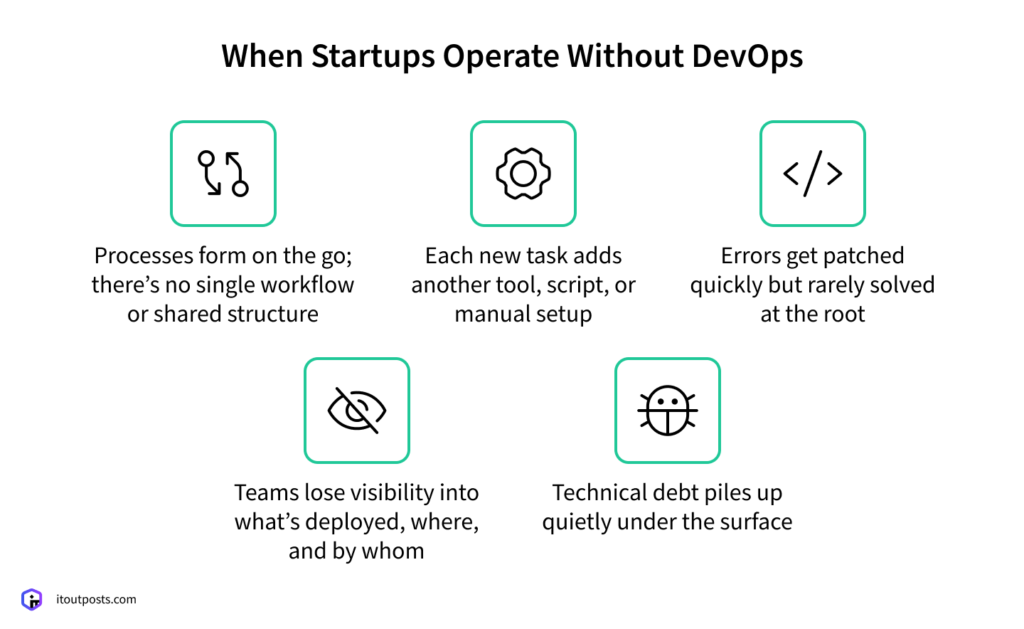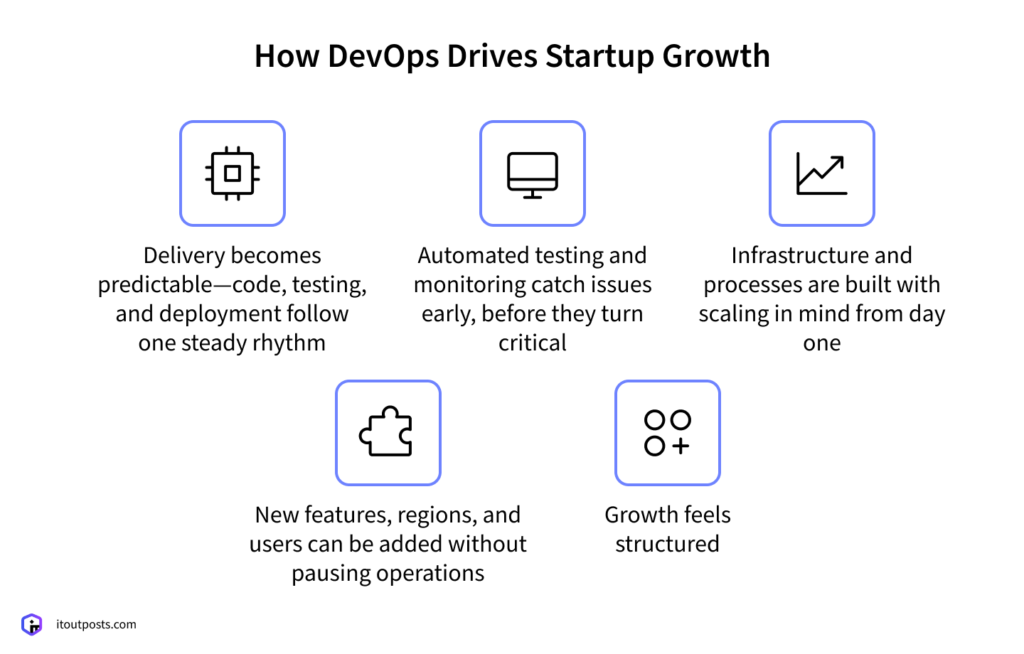Contents
DevOps isn’t about size. It’s about speed, adaptability, and smart growth, and this is exactly what startups thrive on. In this article, we unpack what DevOps actually means for startups and how it can become the backbone of long-term, sustainable growth.
Why DevOps Seems “Too Big” for Startups
For some startups, DevOps may feel like a stage they graduate into, particularly after they’ve raised a few rounds, built a larger team, and finally have time to think about processes instead of just survival.
This perception is understandable. The term DevOps has been packaged and sold with a lot of heavy machinery attached—Kubernetes clusters, cloud services, monitoring systems, automation pipelines, and teams of specialists managing it all. And this may look like an expensive ecosystem that only makes sense once you’re already operating at scale.
But this picture misses the essence of what DevOps actually is.
What DevOps Actually Means (and Why It’s Startup-Friendly)
DevOps isn’t a collection of tools in the first place (although the tools are very much part of it). It’s a way of working that connects development, operations, and business outcomes. DevOps allows you to shorten the distance between an idea and its execution.
After all, startups are, by nature, fast-moving environments. You iterate on ideas daily, reacting to customer feedback and constantly balancing stability with speed. This rhythm is exactly what DevOps was designed for.
The Example of Startup Operating Without DevOps
Still, in young companies, the way operations develop is often pretty unplanned. Tools, workflows, and decisions emerge from immediate needs. An error shows up—you patch it. A new feature requires a different setup—you spin one up. It’s pragmatic and fast, but it also tends to create an invisible layer of complexity.
So while the startup’s goal is to move faster, the structure is frequently skipped. However, over time, this creates the opposite effect—instead of speeding up, the company starts to slow down.
And the trickiest part is that the lack of structure usually isn’t visible at first. But once the audience starts to grow, just when the business needs stability the most, weaknesses in the setup start to surface.
When this happens, there are usually two options, neither ideal. You either have to upgrade the existing system or, in tougher cases, start building a new one from scratch because the old setup simply can’t handle the growth.
Eventually, what began as a way to save time and money ends up demanding both.

How DevOps Acts for Startups as a Growth Multiplier?
Startups that initially start with DevOps in mind tend to think about speed differently. They don’t only think about the launch, but also about how to maintain momentum afterward from a technical standpoint (which inevitably reflects on business results). Ultimately, here’s how DevOps assists them.
DevOps Keeps Delivery Predictable
It does this by connecting all steps of delivery into one automated flow: code is tested the same way every time, deployments follow the same routine, and results are tracked in one place.
When this happens, the company can plan launches like clockwork. Marketing knows when a feature will be ready, sales can align campaigns, and investors see steady progress.
DevOps Prevents Small Issues from Becoming Big Ones
Serious outages frequently begin as tiny oversights that no one notices.
DevOps helps reduce this risk by encouraging constant monitoring and early feedback. As a result, every new change can be automatically tested, and the system will report performance shifts or failures right away.
And this means problems can be detected while they’re still cheap to fix. There are fewer emergencies, less downtime, and less time spent on damage control.
DevOps Makes Scaling Less Painful
DevOps helps startups handle growth because it also encourages building with scale in mind from the very beginning. When you follow the DevOps principles, you design code, infrastructure, and workflows to be repeatable and adjustable.
Eventually, environments can be expanded, and so can processes, like testing, deployment, and monitoring. This approach means that when demand spikes or when you enter a new market, your company doesn’t have to pause and re-architect the architecture. You simply treat scaling as a continuation of normal work.

Does DevOps on a Startup Budget Exist?
All the DevOps benefits we’ve discussed do come with a price tag. Automation tools, monitoring systems, infrastructure scaling—none of it is truly “free.” Setting up CI/CD pipelines, using Docker for consistent environments, managing infrastructure with Terraform, or adding observability platforms like Prometheus or Grafana—it all takes time, money, or both.
But this doesn’t mean DevOps is out of reach for startups. It just means you have to be deliberate about where to invest first to build a system that pays back what you spend on it, in time saved, fewer failures, and smoother growth.
Furthermore, the core DevOps stack today is open-source or has free tiers generous enough for startups. GitHub Actions, Docker, Terraform, and Ansible are great examples. You can deploy, test, and monitor with the same tools big companies use, without their budgets.
So, does DevOps on a startup budget exist?
Absolutely. However, you need to think long-term and set priorities.
At this point, another question for many startups is where do you start, and how do you avoid expensive mistakes later on?
AMIX—a Ready-to-Use Infrastructure Setup for Startups
While balancing speed, cost, and structure usually takes a bit of trial and error, we at IT Outposts have already been through that journey many times, helping product teams launch their solutions faster and scale them without breaking their budgets. That’s why we built AMIX.
AMIX is a ready-to-launch infrastructure setup built around DevOps best practices, a stable, scalable base that lets startups go live without spending weeks (and thousands of dollars) configuring systems from scratch.
It’s a complete package of modern DevOps tools (the kind of setup that normally takes around 160 hours of engineering work).
Inside, you’ll find a full set of preconfigured scripts, from automated deployment pipelines and scalable infrastructure templates to monitoring and security configurations aligned with global standards, along with clear documentation. You can take advantage of AMIX yourself for free, or reach out to our team if you need a hand fine-tuning or expanding it later.

I am an IT professional with over 10 years of experience. My career trajectory is closely tied to strategic business development, sales expansion, and the structuring of marketing strategies.
Throughout my journey, I have successfully executed and applied numerous strategic approaches that have driven business growth and fortified competitive positions. An integral part of my experience lies in effective business process management, which, in turn, facilitated the adept coordination of cross-functional teams and the attainment of remarkable outcomes.
I take pride in my contributions to the IT sector’s advancement and look forward to exchanging experiences and ideas with professionals who share my passion for innovation and success.